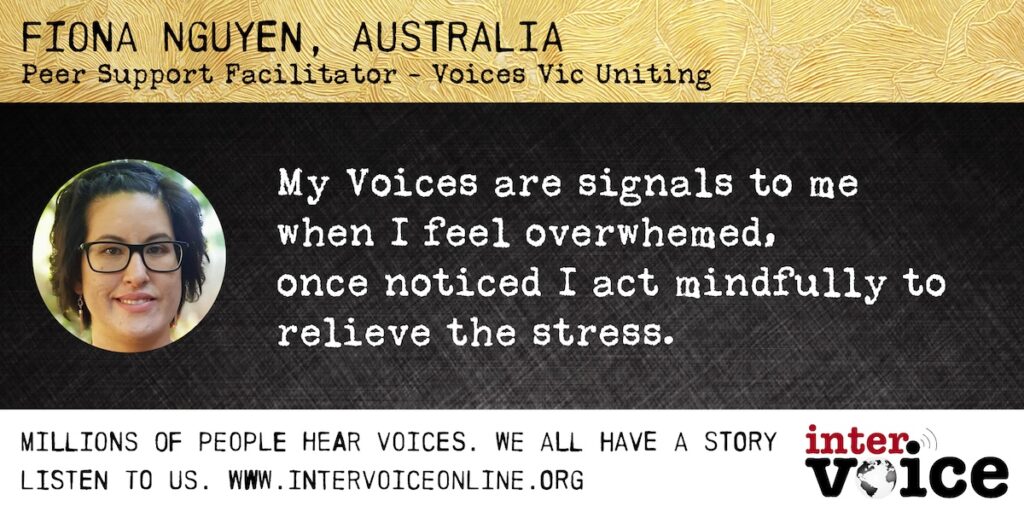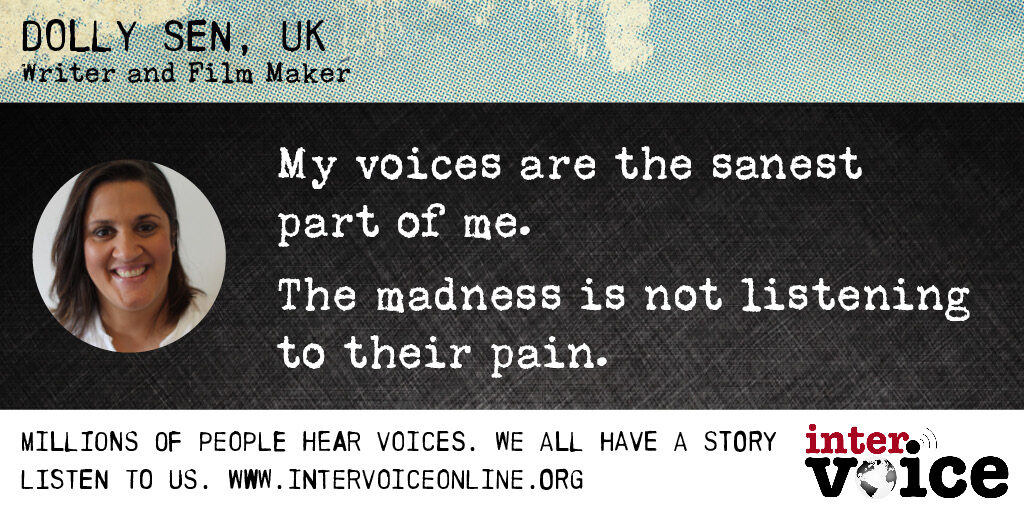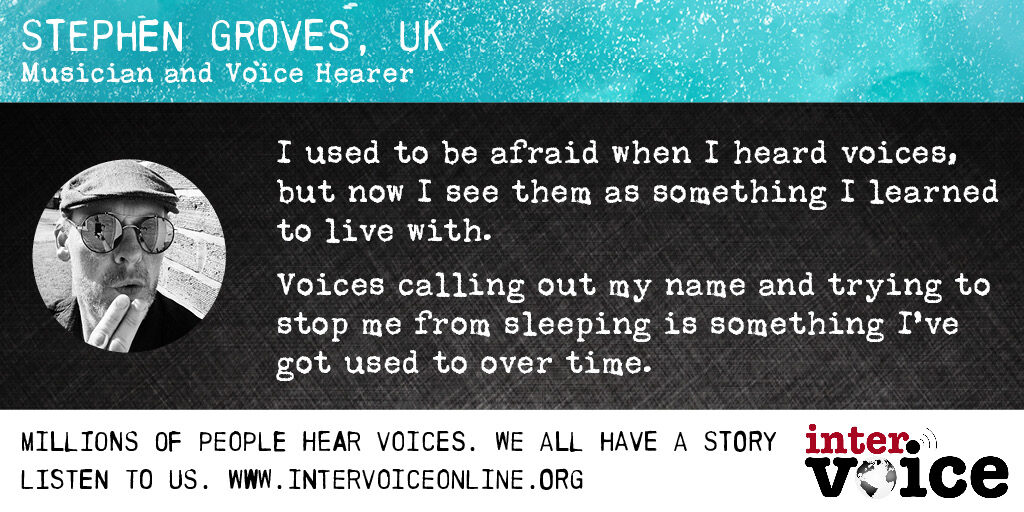The experience of hearing voices unheard by others is probably as old as mankind and well known to the ancient Greeks, we also know it was commonly experienced in Egyptian and early Christian cultures, indeed until the eighteenth century the experience was regarded as divine rather than being considered a health issue. Further, many historically important people (and not just those spiritually inspired) claimed to have heard a voice that acted as their inspiration, they are all on record as having had a “voice” experience, a voice not perceived by others and with no apparent physical cause. In many cases the people named acted on the voice or voices they heard and all are remembered in different ways for the impact these actions have had on the history of the world for better or worse.
Socrates, the Greek philosopher said that he let his life be directed by his daemon, a voice of wisdom, which he did not experience as an aspect of his own thoughts. He also knew that clairvoyant perception could coincide with madness: in other words that a person in the midst of such perception is understandably ill adjusted to the routine demands of every day space and time. Socrates at the time of the trial which led to his death, said of his voice:
“You may have heard me speak of an oracle or sign which comes to me, which my accuser Melitus ridicules and sets out in the indictment. This sign I have had ever since I was a child. The sign is a voice which comes to me and always forbids me to do something which I am going to do, but never commands me to do anything, and this is what stands in the way of being a politician”.
As Fred Johnson says in “The Anatomy of Hallucinations” (1978)
“The inclusion of voice hearing in the list of his crimes may well have been the beginning of a tradition in Western civilisation”.
Throughout human history, there have been descriptions of the ‘voice within’ in religion, in the occult, magical and mystical descriptions, historical, psychological, fictional and mythical. The psychological literature on these experiences has largely focused on individuals considered to be “mad”, while the religious literature concentrates on those thought to be divinely or demoniacally inspired or possessed. Unsurprisingly perhaps, little attention has been given to the inner voice experience of people who fall into neither of these groups. Although there is a small but important body of literature on this subject.
In English for instance there is no technical psychiatric term for the patients subjective experience of hearing the thoughts or inner speech in a conversational form, whilst the term auditory hallucinations gives the impression that the experience is unreal and meaningless. Hearing voices is the best term that has been found to date. Our language though does make references to the experience in other ways the word Vocation means to follow a calling, originally meaning to be called by the voice of God and to act on it. This is not necessarily what most people mean when they say they have a vocation, but that’s the root meaning of the word. Further, the word Panic comes from the direct experience of the Athenians who heard the voice of Pan during a battle that so frightened their enemy that they scattered from the battlefield. Further the word Apocalypse is the Greek word for revelation, which is the discovery of unknown truth as revealed by visions or voices and in Biblical terms as they were revealed to John. In Eastern religions where the ultimate reality is not characterised by a personal God, it is obviously not possible for this reality to speak, therefore Buddhism and Zen does not allow for any kind of voice hearing that has a spiritual value. However, the experienced teachers are aware that disciples may occasionally have the impression that they are hearing voices, and understands that these voices may seem so convincing that the hearer can identify the very spot from which the sounds originate.
On the other hand, the originators of the Western monotheistic religions all had mystical experiences and more often then not heard a voice not apparent to others. In the Judeo-Christian records, God spoke to Adam on the sixth day, giving him instructions about how to behave in the Garden of Eden (Genesis, 2:16-17). God spoke to Moses from a burning bush telling him to guide the Hebrews out of Egypt , and on another occasion, He dictated the Ten Commandments to him (Exodus, 34:27). Mohammed first heard a voice near Mecca as he was walking on his own and meditating, in the Angel Gabriel spoke to Mohammed, he said, “Oh, Mohammed, of a verity thou art the prophet of God” and like many people who have this experience for the first time he looked around him to try and find where the voice came from, but he saw nothing. A few days later he had a vision of the Angel Gabriel who told him that God had chosen him to be a prophet and again his reaction was similar to other voice hearers in that he considered killing himself. On subsequent occasions, over many years, the angel relayed to entire Koran to him.
Throughout the entire Jewish bible, God is found addressing humans in speech: he calls them to account, enters into dialogue with them, and listens to their questions, Christianity has also retained this concept of the personal God and consequently the mystical experience, has without exception, always been expressed in terms of a personal encounter, such as a conversation or a message. We certainly know that Jesus’ contemporaries occasionally considered him to be possessed. To be fair to psychiatrists, I am not saying that they would regard any of these notable voice hearers I’ve named as necessarily mad, although it does make me wonder what they would have made of an emaciated Jesus of Nazareth, following his forty day fast in the desert, his conversations with the devil and his subsequent attempted demolition of the Temple in Jerusalem.
In those parts of the world where Christianity, Islam and Judaism have dominated the idea has survived that the divine may be discovered within human consciousness. Up until the birth of psychology and psychiatry, the Catholic Church claimed the right to classify and judge these individuals according to four main diagnostic categories: canonization, possession, heresy and witchcraft.
Just how do we know who are the prophets and who the mad? and who makes the definitions?
Based on the writings of Dr. Sandra Escher
Also see the article “Voices of Reason, Voices of Insanity by Ivan Leudar and Phil Thomas, Open Mind Magazine, May/June 2000. Leudar and Thomas look back at 2000 years of world history and argue that hearing voices has been unjustifiably pathologised by psychiatry.












